What colors work best with rustic decor? These 5 shades are all you need to perfect a rustic color palette
Rich in earth tones, these easy-to-use colors can be used in each and every room of your home to create the perfect color palette for rustic decor
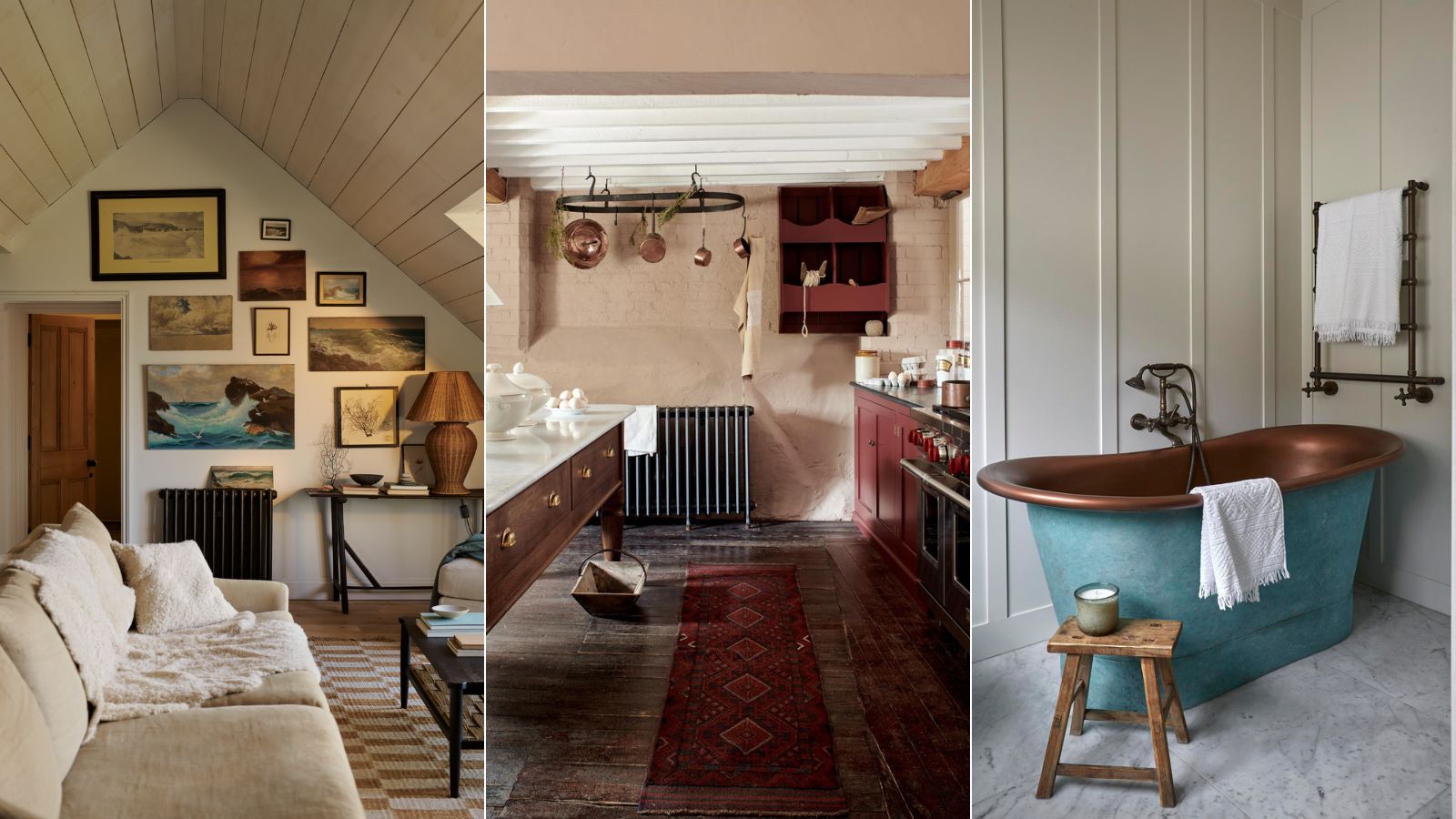
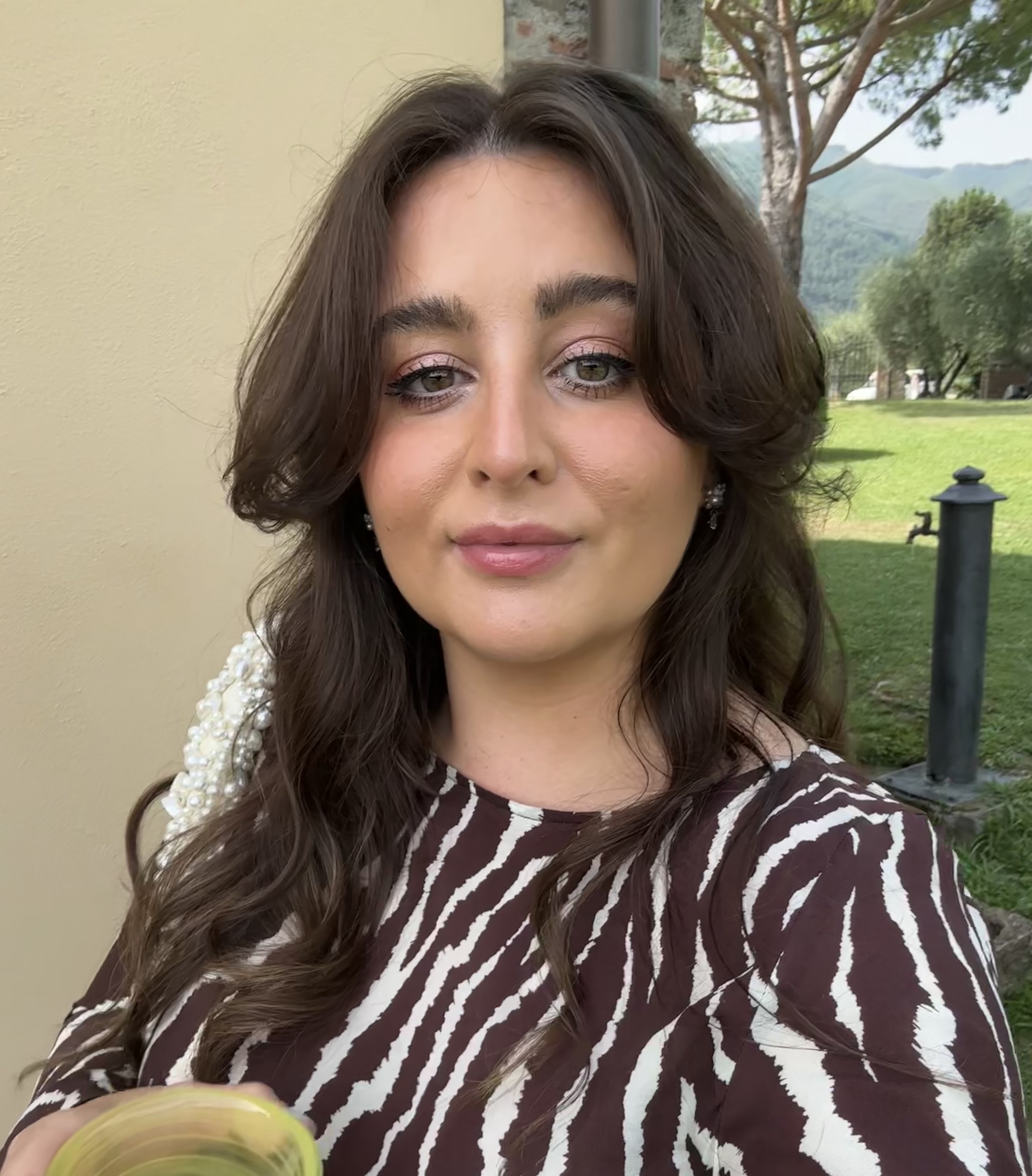
Rustic decor is a classic interior design style. Drawing its inspiration from the ruggedness of the countryside, it embraces and celebrates natural materials, earthy shades, and home decor that resonates with warmth. So of course, the color palette can truly make or break this welcoming aesthetic.
That's where we come in. Honing the ambiance of your space involves more than a slap of paint and some accents; it's about nailing a scheme that harmonizes with the cozy nature of rustic decor. Whether you are designing a new build, revamping a farmhouse, or seeking simple yet impactful updates, starting with the foundations of a color palette is a great place to begin.
To simplify the task at hand, we've asked interior designers and color experts for their thoughts on the colors that work best with rustic decor. Here's what they had to say about this iconic interior design style.
5 Colors That Work Best With Rustic Decor
In the same way you approach any design style, it's important to nail the color scheme first before diving in head first. There are a few paths you can take but it's important to know that rustic colors are grounded and natural, with a base of neutrals and rich, earthy tones like greens, browns, and blues.
In the right room, a rustic color palette will provide a warm, authentic, and relaxed atmosphere that will always feel in style. To help you get inspired and start building your scheme, here are the 5 foundation colors that work best with rustic decor.
1. Warm neutrals
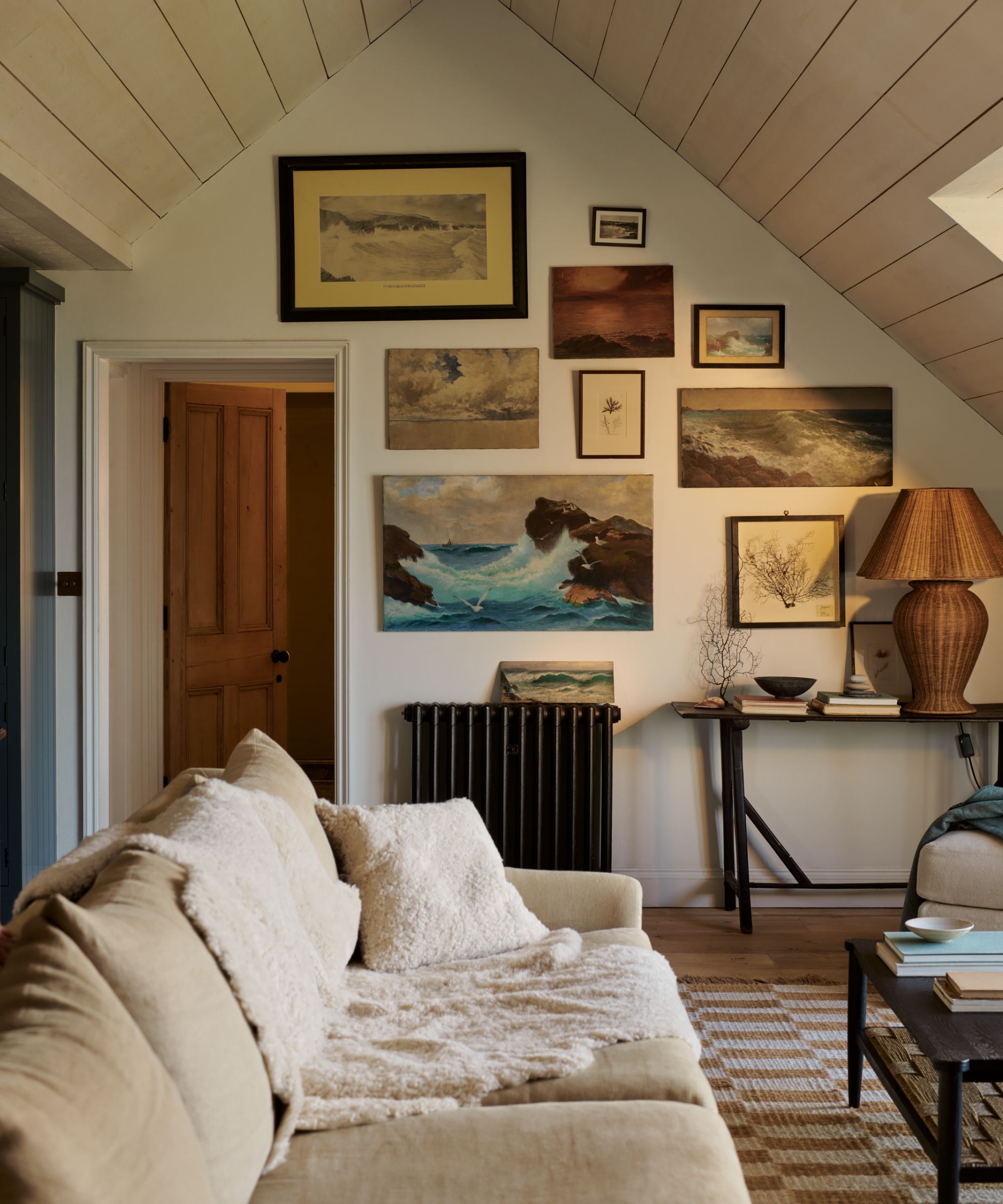
At the heart of this aesthetic lies a dedication to neutrals. Think of perfect background hues like creamy whites, soft beiges, and subtle taupes that evoke a sense of comfort and familiarity, reminiscent of sun-kissed fields and weathered wood.
'A warm neutral palette, think sand, taupe, and terracotta, always looks lovely and natural in a rustic-chic home,' advises Kathy Kuo. 'Anytime you're aiming for rustic, I recommend leaning towards colors that feel both very warm and welcoming, but also very of the natural world. A pop of slate blue, forest green, or russet red looks great against a neutral palette if you're looking to add additional visual interest to your rustic design.'
Warm neutrals also have a calming effect. In rustic spaces, it's crucial to create a cozy vibe where people feel at ease. Whether used as wall colors, upholstery, or in accents, decorating with neutrals infuses every corner of the room with timeless charm and a sense of tranquility.
'When it comes to rustic decoration, focus on a color palette that radiates warmth and natural beauty,' suggests Mara Rypacek Miller, managing director and founder of Industville. 'Neutrals such as beige, taupe, and shades of gray will create a serene backdrop, allowing natural materials like wood and stone to shine. The beauty of this look is that it allows for a multitude of textures and finishes such as raffia, green marble and rattan that all reflect the natural world which is key to achieving this aesthetic.'
2. Organic greens
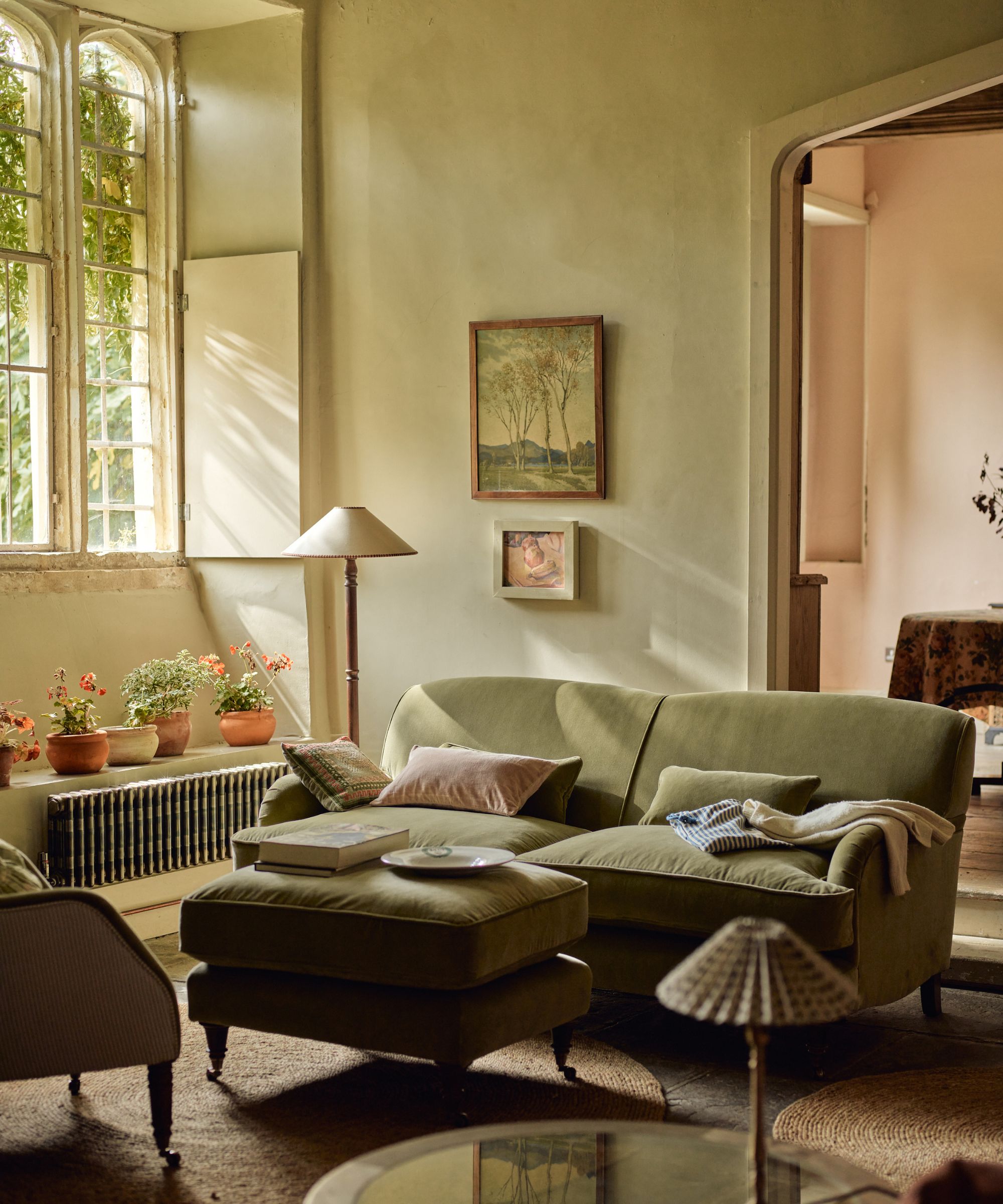
Rooted in nature, organic green shades that reflect the outside world will create a scheme that feels comfortable and familiar. From muted sage to deep forest green, green tones evoke lush landscapes and verdant foliage, seamlessly blending rustic decor.
'Colors in rustic interiors tend to lean towards soft whites, warm neutrals dispersed with muted greens and duck egg blues,' says Ruther Mottershead, creative director at Little Greene. 'These shades are perfect a rustic look as not only do they sit together in a palette that’s true to the style, but the tonality of these colors allows for a look that can transition throughout the space, from room to room.'
In rustic design, it's essential to capture the essence of the great outdoors. Decorating with green will add depth and dimension that nods to nature, seamlessly blending with the earthy elements synonymous with rustic decor.
'If you want to use a strong green in a small area then there is nothing more chic than Duck Green from Farrow & Ball,' says Joa Studholme, color curator for Farrow & Ball. 'It feels strangely familiar, like something from our childhoods, while still retaining an element of sophistication. This color is not challenging - in north light, it works brilliantly when used on both walls and woodwork. In south light, it will appear cleaner and more green and is best suited to use on walls with an upbeat ceiling color like Middleton Pink No.245.'
3. Shades of blue
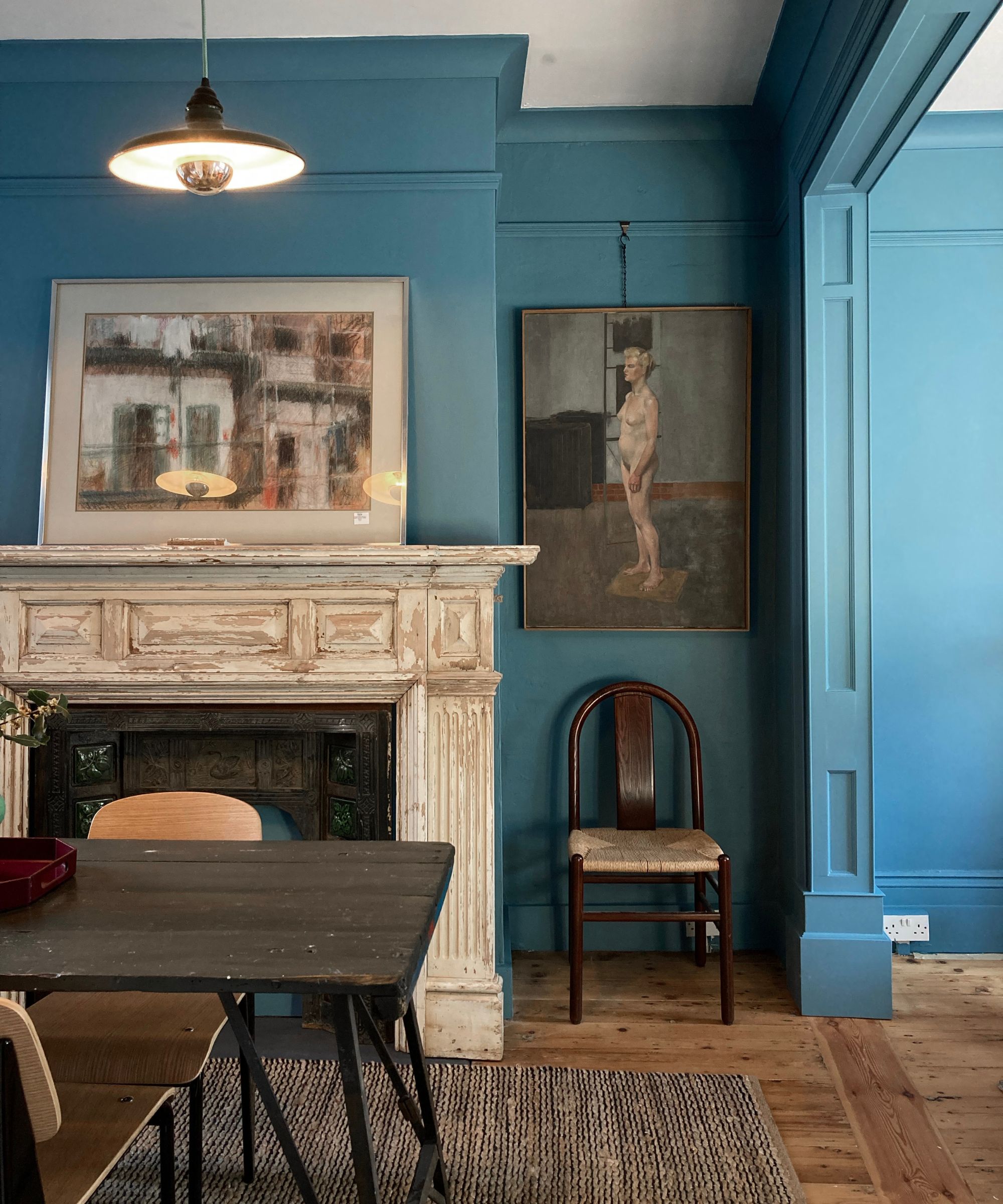
Blue hues offer a refreshing contrast to green and beige. Look to every shade from soft sky blues to deep navy (popular in rustic kitchens) and even teal to bring a sense of calm and clarity to rustic spaces. Blue can be a nice departure from traditional earth tones, creating a serene ambiance that fosters relaxation.
While for some, teal might read a little bold, Grazzie Wilson, head of creative at Ca’ Pietra and Proper Good Paint, suggests it's a great option for that modern rustic mix. 'The rustic color palette swings heavily towards neutral, and rich earthy tones like greens, blues, and browns. One of our favorite colors is a subtle take on teal, as it can have hints of green, blue, and even gray, and it can feel both rustic and modern in one. Pair with either a classic checkerboard floor, for a more refined French chateaux vibe or with a room full of wood, brass, and leather accents,' she suggests.
Furniture and architectural details in rustic homes are often left raw and unfinished, like in the dining room space seen above that is painted in Eaton Square™ from Mylands, a vintage-feeling mid-blue. Blue tones can provide the perfect counterbalance to the rugged textures and materials popular in the design style.
4. Deep, earthy reds
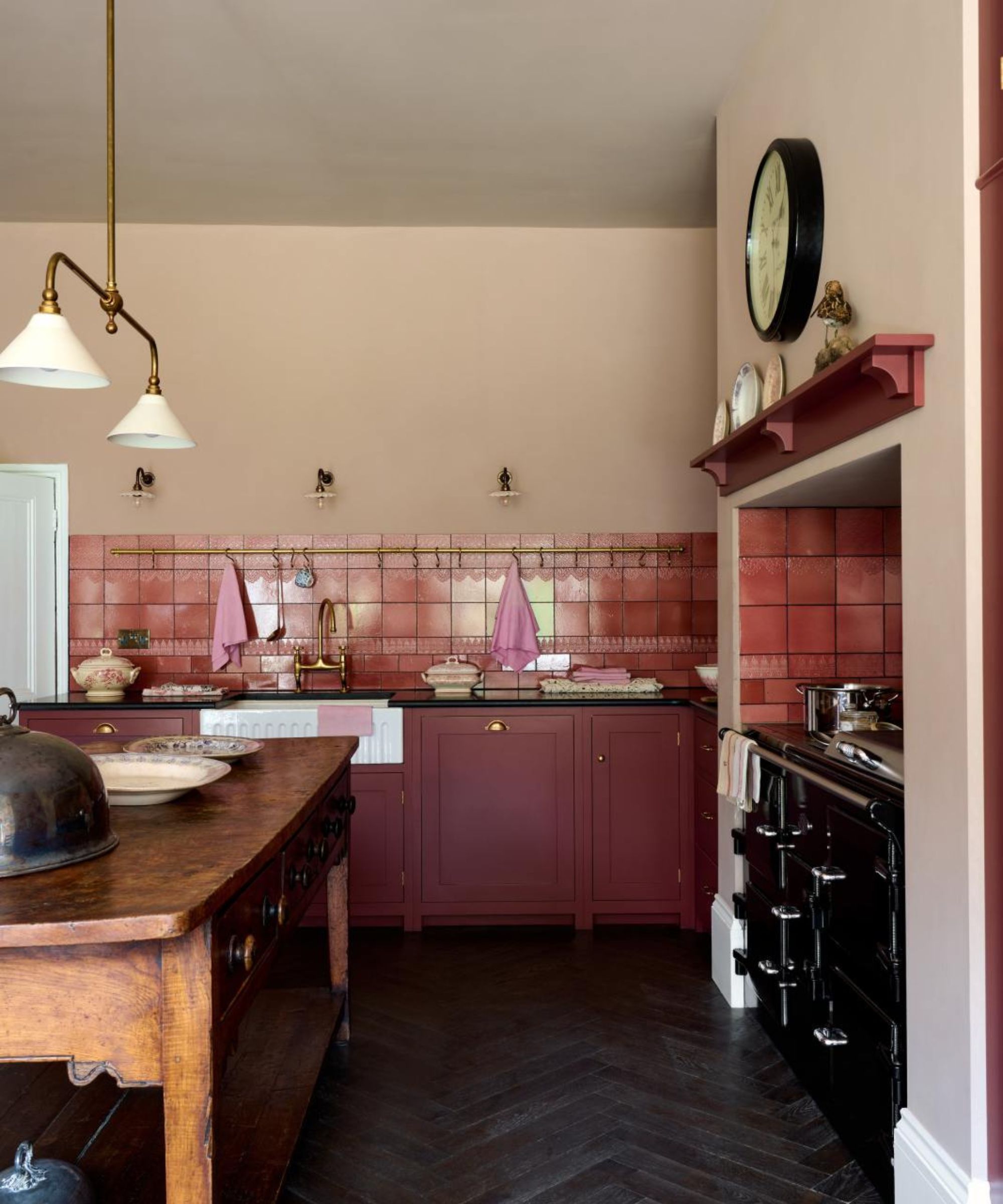
Introduce more saturated hues with a little unexpected red. Rich, moody red tones will inject a sense of passion and vitality into rustic interiors – think to consider decorating with burgundy, rustic terracotta tones, or ruddy red-browns that still feel of the earth.
'Earthy tones offer a warm and inviting foundation for any home,' says Emily Brown, founder of Emily Lauren Interiors. 'For a dramatic vibe, embrace deep burgundies, browns, and ochres, softened with creamy whites and tans. A touch of bronze or black can add sophistication,' she suggests.
'If you prefer a lighter touch, look to warm whites, ivories, mid-toned browns, and earthy greens create a timeless backdrop, accented with pops of black for contrast,' continues Emily. 'But, if you're feeling more adventurous, aubergine or eggplant paired with a moody greige or warm taupe offers a surprisingly modern take on rustic, showcasing the versatility of earth tones.'
Red evokes a sense of heritage, like in the kitchen by deVOL. When using red in a neutral color scheme, its presence creates a sense of energy and warmth that resonates throughout the room. Just be sure to stick to more muted versions of the trendy shade.
5. A spectrum of light to chocolate browns
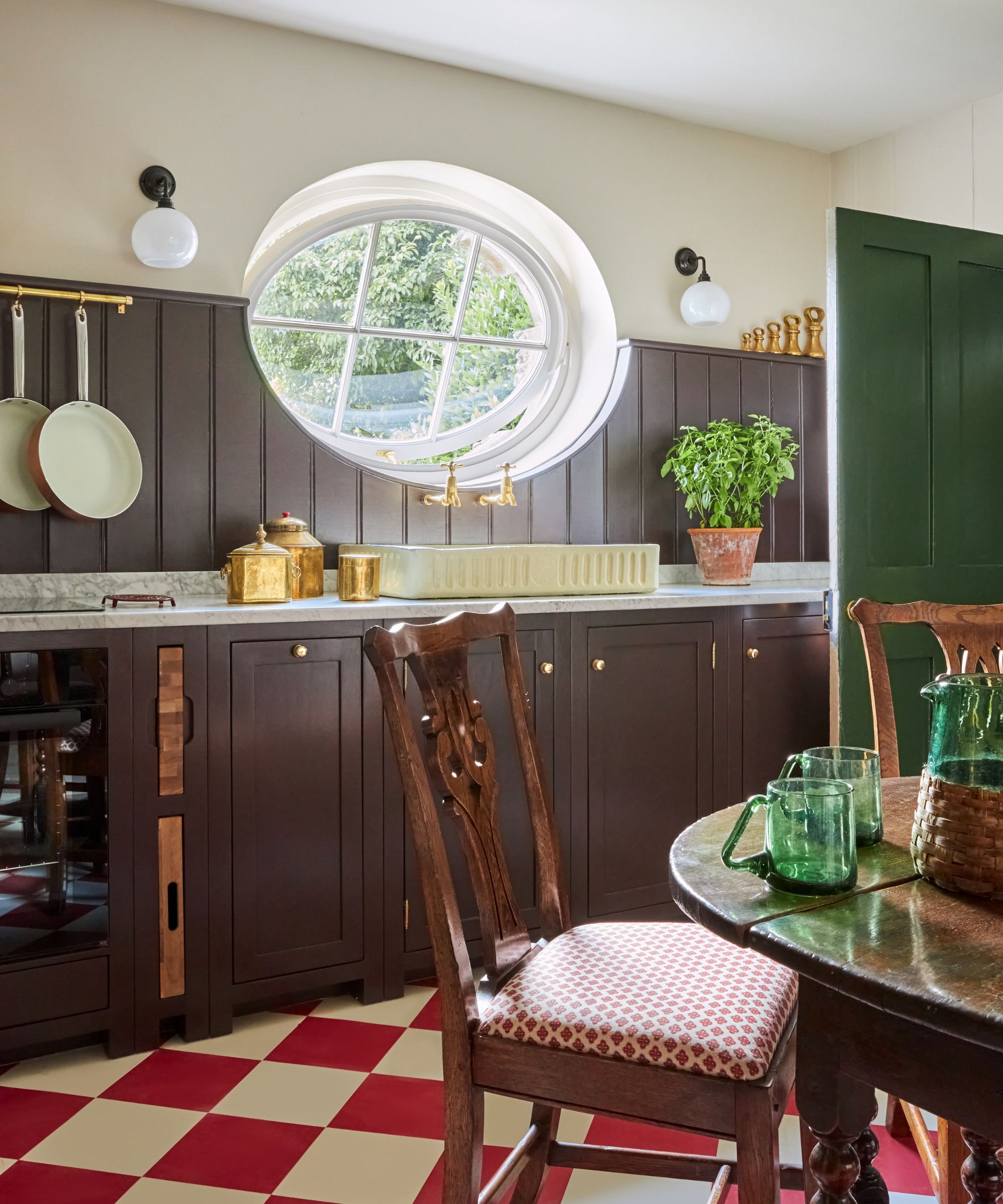
A standout color trend in 2024 is a moody and soft brown. Infusing spaces with indulgent, rich cocoa tones or warm mocha shades, decorating with brown creates a comforting ambiance in any rustic setting.
'The move towards embracing brown is a continuation of the trend we have seen shifting away from cooler gray interiors to a warmer palette of comforting, soothing schemes,' says Ruth Mottershead. 'The earthy yet refined nature of brown shades makes them the perfect backdrop to rustic materials like wicker, rattan, warm woods, and stone finishes. Shades of honey, caramel, and chocolate will bring comfort into our homes, creating cozy enveloping interiors that appeal to all the senses.'
Brown is a quintessential color for rustic interiors, imbuing spaces with richness, and warmth that makes you feel right at home. 'Perfect for use in ‘all-over’ schemes, more neutral brown works really well in a color-drenched room as an alternative to white, gray, or stone,' adds Ruth. 'Juxtapose them with deeper browns and blacks to create a captivating, sophisticated interior,' she suggests.
'As we turn towards comfortable colors in our homes, Broccoli Brown from Farrow & Ball, a quiet dark stone color, is the perfect choice,' advises Joa Studholme. 'It sits effortlessly alongside natural materials such as weathered wood and flagstone floors, feeling modern despite having historic roots.'
Remember, the key to creating a truly enchanting rustic space lies not only in the choice of colors but also in the thoughtful curation of textures, materials, and personal touches that reflect your unique style and sensibilities. Then, look to embrace the charm of warm neutrals, the tranquility of greens and blues, the passion of deep reds, and the richness of chocolate browns. And finally, a rustic home is not one built on perfection, so let yourself live a little and don't be too stuck to hard and fast rules.
Sign up to the Homes & Gardens newsletter
Design expertise in your inbox – from inspiring decorating ideas and beautiful celebrity homes to practical gardening advice and shopping round-ups.

Charlotte is the style and trends editor at Homes and Gardens and has been with the team since Christmas 2023. Following a 5 year career in Fashion, she has worked at many women's glossy magazines including Grazia, Stylist, and Hello!, and as Interiors Editor for British heritage department store Liberty. Her role at H&G fuses her love of style with her passion for interior design, and she is currently undergoing her second home renovation - you can follow her journey over on @olbyhome
-
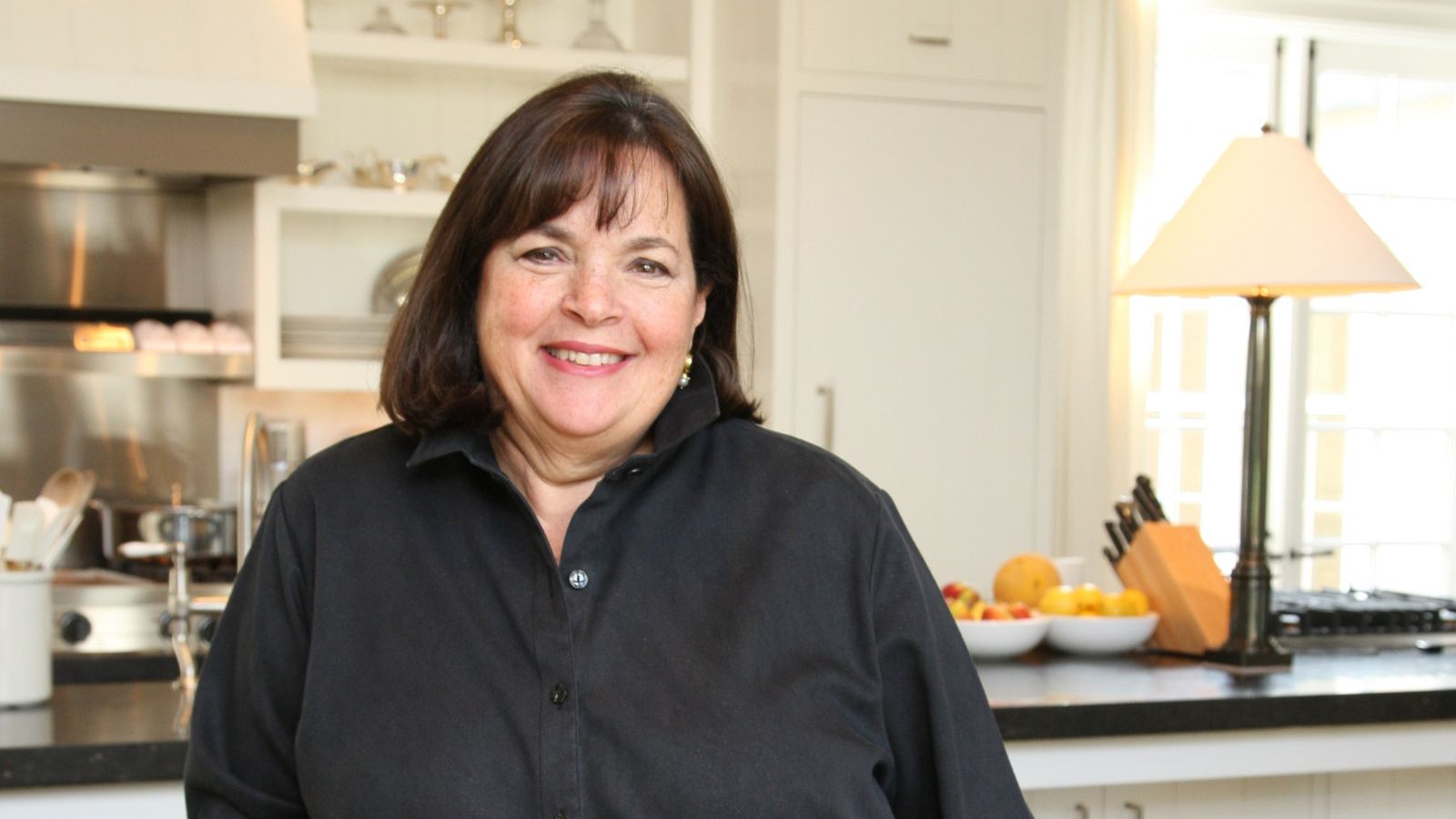 Ina Garten's storage pantry is an insightful window into all of the best cookware used by the chef – and it's easy to recreate on your kitchen shelves from $48
Ina Garten's storage pantry is an insightful window into all of the best cookware used by the chef – and it's easy to recreate on your kitchen shelves from $48The beautiful dishware in The Barefoot Contessa's Hamptons pantry showcases the tools she uses most often to cook – this is exactly how you replicate it
By Sophie Edwards Published
-
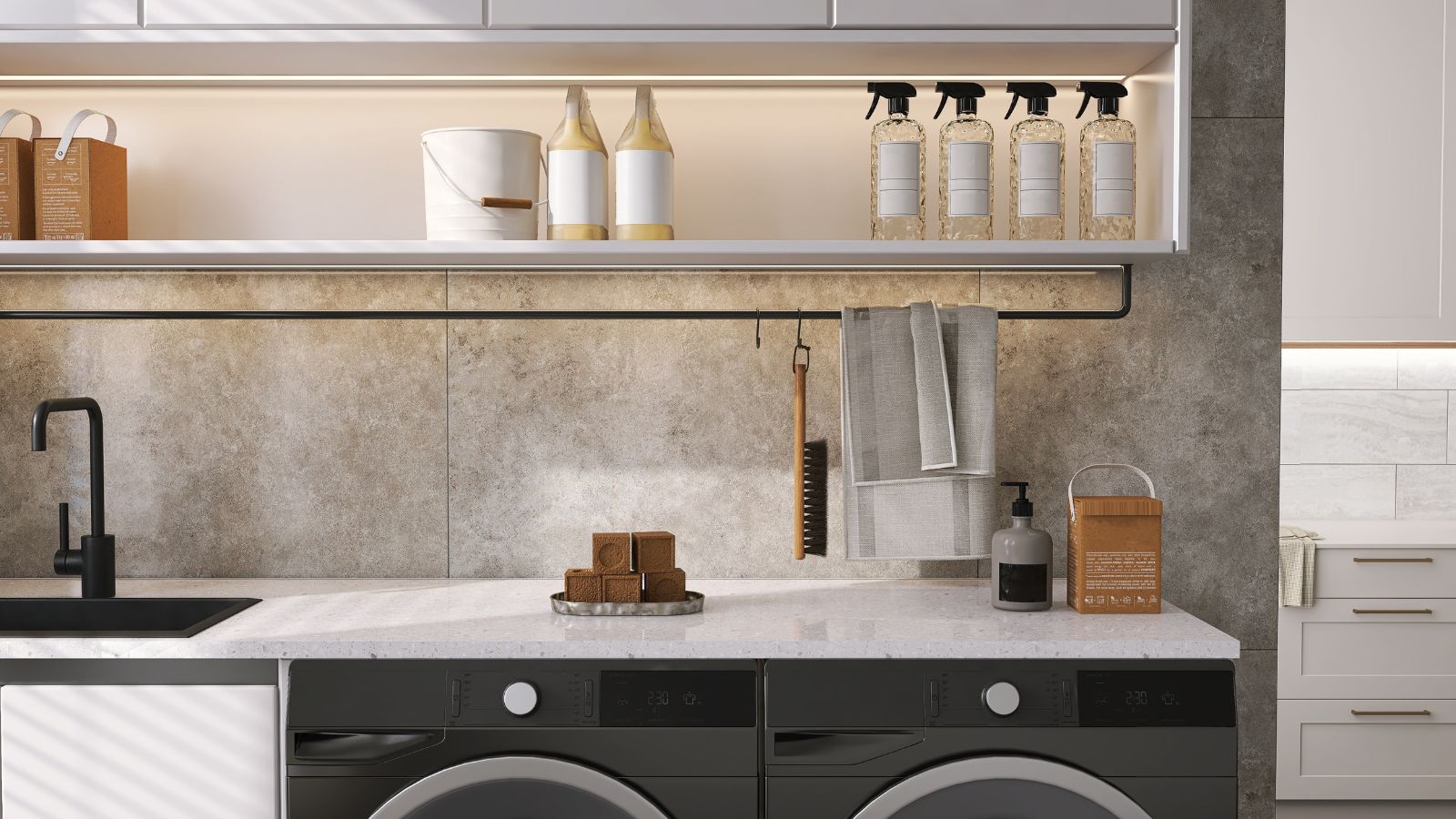 Extend the lifespan of your appliance with 5 simple but crucial washing machine maintenance tips
Extend the lifespan of your appliance with 5 simple but crucial washing machine maintenance tipsFrom cleaning the filters to keeping the door open, experts reveal the washer tips they swear by
By Andy van Terheyden Published